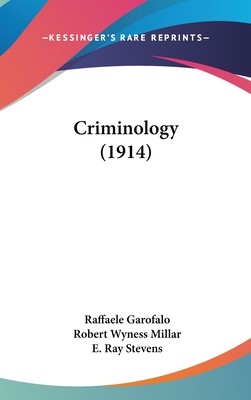
- We will send in 10–14 business days.
- Author: Raffaele Garofalo
- Publisher: Kessinger Publishing
- ISBN-10: 1436668387
- ISBN-13: 9781436668385
- Format: 15.2 x 22.9 x 3.3 cm, hardcover
- Language: English
- SAVE -10% with code: EXTRA
Reviews
Description
Excerpt: ... impossible. This is why, in human society, the absence of the qualities essential to the aggregate existence changes the necessity of social life into the opposite necessity, namely, that of severing every bond of union with the inassimilable individual. And it is precisely into this idea of necessity that the idea of law resolves itself. The individual has a right to the social life because he has absolute need of it. But his personal necessity in this regard must be subordinated to the necessities of society. Metaphorically speaking, the individual represents but a cell of the social body.1 Consequently, when he is a source of harm to the body, he can have no right longer to remain a part of it. But let the reader not misunderstand. Such a necessity does not exist in every case of offense to the moral sentiments of the aggregation. It exists only where their violation is the symptom of a permanent psychologic anomaly which renders the subject forever incapable of the social life. Now, this sort of incapacity cannot be predicated of other than criminals of our first class--those offenders, who, as pointed out in a former place, are prone to commit murder solely from egoistic motives--the influence of prejudices or the faults of the environment in nowise contributing. In none of the other classes does this absolute incapacity exist. To apply the death penalty to members of the latter classes would cause the public conscience to revolt. Hence it is to be employed only against criminals of the first class. For the others, adaptation is always possible, but the difficulty is to find the environment which will make it probable. We encounter individuals who are incompatible with any civilized environment. Their savage instincts are incapable...
EXTRA 10 % discount with code: EXTRA
The promotion ends in 18d.10:24:42
The discount code is valid when purchasing from 10 €. Discounts do not stack.
- Author: Raffaele Garofalo
- Publisher: Kessinger Publishing
- ISBN-10: 1436668387
- ISBN-13: 9781436668385
- Format: 15.2 x 22.9 x 3.3 cm, hardcover
- Language: English English
Excerpt: ... impossible. This is why, in human society, the absence of the qualities essential to the aggregate existence changes the necessity of social life into the opposite necessity, namely, that of severing every bond of union with the inassimilable individual. And it is precisely into this idea of necessity that the idea of law resolves itself. The individual has a right to the social life because he has absolute need of it. But his personal necessity in this regard must be subordinated to the necessities of society. Metaphorically speaking, the individual represents but a cell of the social body.1 Consequently, when he is a source of harm to the body, he can have no right longer to remain a part of it. But let the reader not misunderstand. Such a necessity does not exist in every case of offense to the moral sentiments of the aggregation. It exists only where their violation is the symptom of a permanent psychologic anomaly which renders the subject forever incapable of the social life. Now, this sort of incapacity cannot be predicated of other than criminals of our first class--those offenders, who, as pointed out in a former place, are prone to commit murder solely from egoistic motives--the influence of prejudices or the faults of the environment in nowise contributing. In none of the other classes does this absolute incapacity exist. To apply the death penalty to members of the latter classes would cause the public conscience to revolt. Hence it is to be employed only against criminals of the first class. For the others, adaptation is always possible, but the difficulty is to find the environment which will make it probable. We encounter individuals who are incompatible with any civilized environment. Their savage instincts are incapable...


Reviews